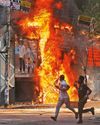
IT has been about five years since the abrogation of Article 370 and yet a profound ambivalence still lingers in the air in Kashmir. The people remain caught in a web of uncertainty—torn between two competing realities. On the one hand, there is an undeniable sense of loss—the stripping away of a special status that once defined the region’s unique identity within the Indian Union—and on the other, there is a tentative hope that perhaps this new order will bring opportunities that the past had failed to deliver. But the question still haunts the Valley: Was the removal of Article 370 a blow to their autonomy or a gateway to a more prosperous future? The answer, it seems, is elusive. Each person harbours their own truth, their own sense of what has been lost and what may yet be gained. And in this symphony of emotions, where grief and hope play out in uneasy harmony, one thing is clear: no one quite knows which note to strike.
Whatever happened to Article 370 and whatever emotional toll it has had on the minds and souls of the people of Kashmir, time has kept its steady pace and life has never ceased to exist in this part of the world, as was otherwise assumed from time to time. Time, in its implacable stride, continues its course. Yet time’s steady march is not without irony for it moves like a river, cutting through mountains yet softening the stone. As we see in Kashmir, there is a curious and perhaps unsettling normalcy that has taken root. The streets are no longer echoing with the chants of protest, the strikes that once paralysed the Valley have become relics of a past era. There are no more stones hurled in anger, no more children rendered blind by the cold brutality of pellet guns. Kashmir, once a land of unspoken grief, has found itself lifted from the prime-time news cycle where once it was a constant subject of debate. A silence thick as a mist has enveloped the Valley, but it is a silence that holds its own secrets.
This story is from the October 11, 2024 edition of Outlook.
Start your 7-day Magzter GOLD free trial to access thousands of curated premium stories, and 9,000+ magazines and newspapers.
Already a subscriber ? Sign In
This story is from the October 11, 2024 edition of Outlook.
Start your 7-day Magzter GOLD free trial to access thousands of curated premium stories, and 9,000+ magazines and newspapers.
Already a subscriber? Sign In

Nomadland
All eyes are on President-elect Donald Trump and his policy on immigration

Far from Home
We have forgotten the plight of Afghans who fled to India, and continue to suffer

Bang Bang That Awful Sound
What happens when we listen closely to the soundscape of war?

Refugee Dilemma
For most Indian-origin Sri Lankan Tamils, who are victims of ethnic conflict and civil war, proving that they are not illegal migrants is a nearly impossible task

They Poured Fire on Us
The resilience of refugee women from Sudan, Ethiopia and Yemen in the face of war and displacement is remarkable

The Sound and the Fury
Iraqi poet, novelist, translator and scholar Sinan Antoon was born and raised in Baghdad.

The Day I Became a Woman
In a country where authorities have been directly engaging in the gruesome war against women for decades, artists like Nahid Hassanzadeh stand apart as a voice of dissent–a haunting reminder of the unwavering spirit of the rebellious Iranian women fighting against the Islamic Republic’s violent crackdown.

The Kite Runner
The official figure of civilian deaths in Afghanistan is a serious underestimate. It is unlikely that we will ever know the real cost of Afghan lives

American Patriot
Barring a few exceptions, Hollywood movies continue to be gung-ho about the United States' penchant for waging wars across the globe

The Hunters
How can Bangladesh's fractured society, burdened by layers of trauma, begin to heal?